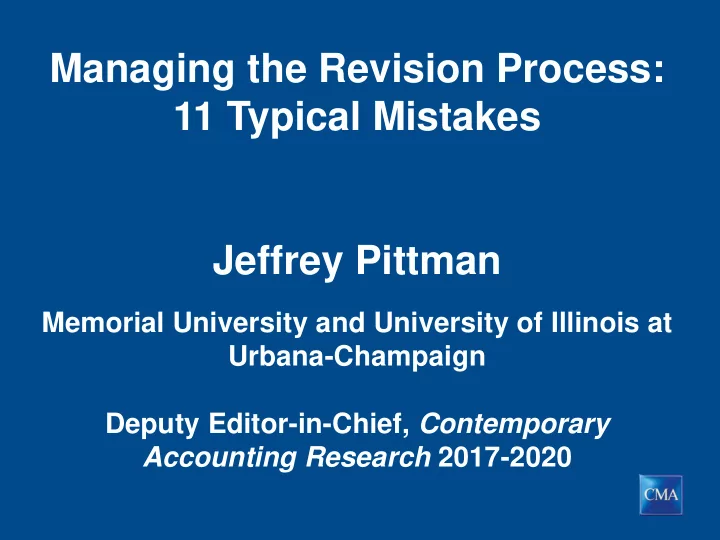

Managing the Revision Process: 11 Typical Mistakes Jeffrey Pittman Memorial University and University of Illinois at Urbana-Champaign Deputy Editor-in-Chief, Contemporary Accounting Research 2017-2020
1. Failing to properly develop a revision strategy Failing to reach out to senior colleagues or others for advice on handling revisions Importantly, avoid settling on a response strategy too early
2. Concluding that the editor and/or referee is an idiot 3 potential scenarios: (i) They actually understand the issue in play (ii) They do not understand the issue, although even this is your fault in that, for example, you have not properly explained the rationale behind your empirical strategy (iii) The editor and/or referee actually is an idiot – more on this later
3. Failing to fully grasp that the editor trusts the referee The editor chose this referee after all Avoid criticizing the referee in your cover letter to the editor (some rare exceptions) Editors routinely rely on one referee more than the other
4. Failing to “go big or stay home” Go Big: Half-heartedly tackling revisions almost certainly will translate into rejection on the next round Stay home: There may be some (infrequent) occasions when it would be in your best interests to not to pursue a revision invitation; e.g., you adamantly disagree with the revision direction
5. Failing to “delight the referees” (Mark Nelson, Cornell) If you decide to pursue a revision invitation, then try to exceed the referees’ expectations If possible, do more than they ask This will almost certainly lead to a better paper However, importance of ensuring that major revisions are cohesively integrated
6. Harassing the editor at a conference This is almost impossible to justify Consider the reputational fallout In any event, it is highly unlikely that the editor is in a position to provide good advice in this setting Avoid calling or emailing the editor
7. Only reluctantly revising the paper “I read papers, not memos” (Katherine Schipper, former JAR editor and current CAR editor) You need to revise the paper, rather than argue with the referee in your response Some referees focus more on the revised paper than the response memo, and vice versa – importance of comprehensively addressing their points in both documents
8. Failing to behave strategically Major journals typically rely on top researchers as referees: they are usually open-minded For example, if you revise the paper to address 9 of their 10 points on your paper, they may be accommodating on the final point if your rationale is solid You can accumulate credibility as the paper proceeds through the review process
9. Failing to fully value the referee’s insights Ideally, should be an “intellectual process” (Clive Lennox, TAR editor) If the revision process goes well, then this will lead to a stronger paper – this is in everyone’s best interests, including your own Don’t focus too narrowly on getting the paper accepted Take a broader perspective by appreciating this opportunity to learn – value insights from the review process
10. Failing to understand the journal’s reputation For example, two major accounting journals: (i) For the Journal of Accounting & Economics ( JAE ), a revise-and-resubmit is a highly positive signal (ii) For the Journal of Accounting Research ( JAR ), a revise-and-resubmit is a very noisy signal Punch-line: generally, more eager to pursue a R-and-R at JAE than JAR
11. Failing to manage your projects Focusing on new projects (low publication likelihood) at the expense of R-and-R’s (higher publication likelihood)
Other issues Wide variation in referee report quality: in my experience, 20% are low-quality – occasionally stemming from referee bias against a paper Whether to appeal a rejection: (i) likely only prudent when the editor or referee made an unambiguous error or some form of impropriety occurred (scarce events) (ii) consider reputational damage unless your case is genuinely strong (consider getting a second opinion from a trusted colleague)
Other issues The review process is inherently noisy with type 1 and 2 errors regrettably routinely occurring However, if 50% of good papers are rejected, then it is highly likely that you will publish your paper in one of the major journals
Other issues Some journals allow you to nominate a handling editor or the non-consideration of certain referees: (i) If you nominate an editor, ensure that the reasons outlined in your cover letter are sensible (e.g., expertise in the area), rather than strategic (ii) if you think that a certain potential referee would be biased against your paper (e.g., you criticize their research), then cogently explain this concern – avoid leaving the impression that you are trying to obtain an unfair advantage
Recommend
More recommend